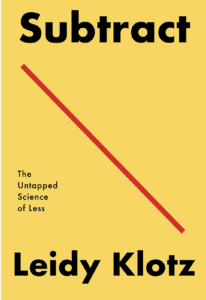
Article Provided by Randy Sherman of Radius Athletics
You can follow him on Twitter @RadiusAthletics
I ran across an article that caught my attention this week. The author, Leidy Klotz, is an engineer and professor at the University of Virginia and his new book Subtract: The Untapped Science of Less seems right up my alley!
In Subtract, Klotz writes that “in our striving to improve our lives, our work, and our society, we overwhelmingly add. We overlook the option to subtract from what is already there.”
Followers of this newsletter and my tweets know that I am a proponent of simplification as it pertains to coaching. In an age of information abundance, it takes great power to focus when new ideas are all around you. Most coaches are adding; few coaches are subtracting. Why?
It seems the coaching offseason is when this is at its apex for coaches. Inspired by Klotz’s book and its thesis I want to pose some questions for coaches to consider this offseason. These questions serve as sort of a challenge to coaches as they evaluate their season and prepare for the next one.
When faced with a tactical problem, do I tend to solve it by adding a fix or simplifying?
Is my knee jerk after a loss to add or subtract?
Are we adding solution after solution to address problems we could just avoid altogether?
Are our players given too many options? Which options could be removed to make their decisions faster and easier?
Are there cuts, screens, actions in our offense that could be getting in the way?
Are our defensive tactics lean and repeatable? Or are we constantly adding in response to different scenarios?
Are we adding drills that just work on the same thing a different way?
When we do add, are we advancing or deepening our players knowledge? Or are we just giving them something else to memorize?
When we do add, are we also subtracting? Is what we add replacing anything? Or are we just lumping on?
What is in our physical space that we can subtract? Is our locker room cluttered? Is my coaching office (drawers, cabinets) cluttered? Is our equipment closet cluttered with junk? Is my computer/phone full of stuff?
Is what we are adding better? Or just something else?
Have I convinced myself that “good coaches” and “good teams” have a thick, complex and intricate playbook?
If we add something in response to a problem, do it solve the underlying issue? Or is it just a workaround that allows the underlying issue to fester?
Can we realistically expect our additions to be executed in game play?
Can I pause for a moment before adding and consider subtraction as an alternative?
[adinserter name=”Block 3″]
Have I asked the players I coach if they want me to add or subtract?
On offense, if we made an acceptable percentage of good shot opportunities our tactics generated would I still be considering adding?
The offseason is hailed as improvement season for coaches. It certainly can be. The questions raised here are not anti-improvement; quite the opposite. The purpose is to consider the power of subtraction when the reflex to add seems to be our default. My hope is that these questions guide your offseason and prevent you from some of the pitfalls Klotz writes about.
Subtracting has to do with doing less, not thinking and studying less. Study deeper. Learn many, but commit to few.
Continue the conversation:
For help with guidance and leadership during your coaching journey join our community for basketball coaches!
Enjoy all our basketball coaching resources.
Any questions, contact us! Happy to talk hoops any time day or night!






